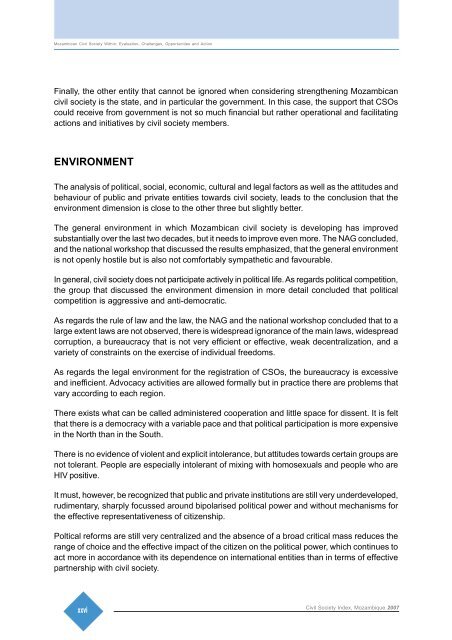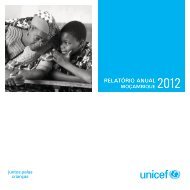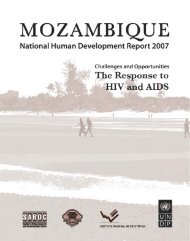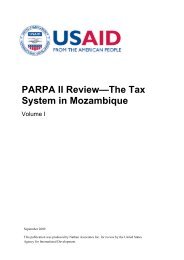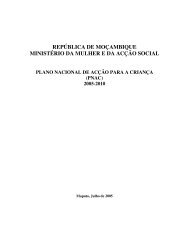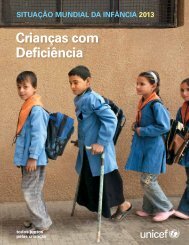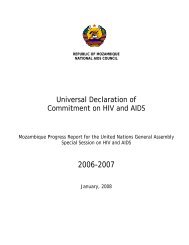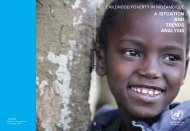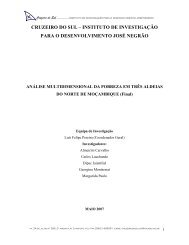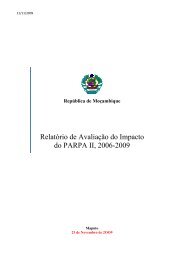Mozambican Civil Society Within: - UNICEF Mozambique - Home page
Mozambican Civil Society Within: - UNICEF Mozambique - Home page
Mozambican Civil Society Within: - UNICEF Mozambique - Home page
Create successful ePaper yourself
Turn your PDF publications into a flip-book with our unique Google optimized e-Paper software.
<strong>Mozambican</strong> <strong>Civil</strong> <strong>Society</strong> <strong>Within</strong>: Evaluation, Challenges, Opportunities and Action<br />
Finally, the other entity that cannot be ignored when considering strengthening <strong>Mozambican</strong><br />
civil society is the state, and in particular the government. In this case, the support that CSOs<br />
could receive from government is not so much financial but rather operational and facilitating<br />
actions and initiatives by civil society members.<br />
ENVIRONMENT<br />
The analysis of political, social, economic, cultural and legal factors as well as the attitudes and<br />
behaviour of public and private entities towards civil society, leads to the conclusion that the<br />
environment dimension is close to the other three but slightly better.<br />
The general environment in which <strong>Mozambican</strong> civil society is developing has improved<br />
substantially over the last two decades, but it needs to improve even more. The NAG concluded,<br />
and the national workshop that discussed the results emphasized, that the general environment<br />
is not openly hostile but is also not comfortably sympathetic and favourable.<br />
In general, civil society does not participate actively in political life. As regards political competition,<br />
the group that discussed the environment dimension in more detail concluded that political<br />
competition is aggressive and anti-democratic.<br />
As regards the rule of law and the law, the NAG and the national workshop concluded that to a<br />
large extent laws are not observed, there is widespread ignorance of the main laws, widespread<br />
corruption, a bureaucracy that is not very efficient or effective, weak decentralization, and a<br />
variety of constraints on the exercise of individual freedoms.<br />
As regards the legal environment for the registration of CSOs, the bureaucracy is excessive<br />
and inefficient. Advocacy activities are allowed formally but in practice there are problems that<br />
vary according to each region.<br />
There exists what can be called administered cooperation and little space for dissent. It is felt<br />
that there is a democracy with a variable pace and that political participation is more expensive<br />
in the North than in the South.<br />
There is no evidence of violent and explicit intolerance, but attitudes towards certain groups are<br />
not tolerant. People are especially intolerant of mixing with homosexuals and people who are<br />
HIV positive.<br />
It must, however, be recognized that public and private institutions are still very underdeveloped,<br />
rudimentary, sharply focussed around bipolarised political power and without mechanisms for<br />
the effective representativeness of citizenship.<br />
Poltical reforms are still very centralized and the absence of a broad critical mass reduces the<br />
range of choice and the effective impact of the citizen on the political power, which continues to<br />
act more in accordance with its dependence on international entities than in terms of effective<br />
partnership with civil society.<br />
xxvi<br />
<strong>Civil</strong> <strong>Society</strong> Index, <strong>Mozambique</strong> 2007


